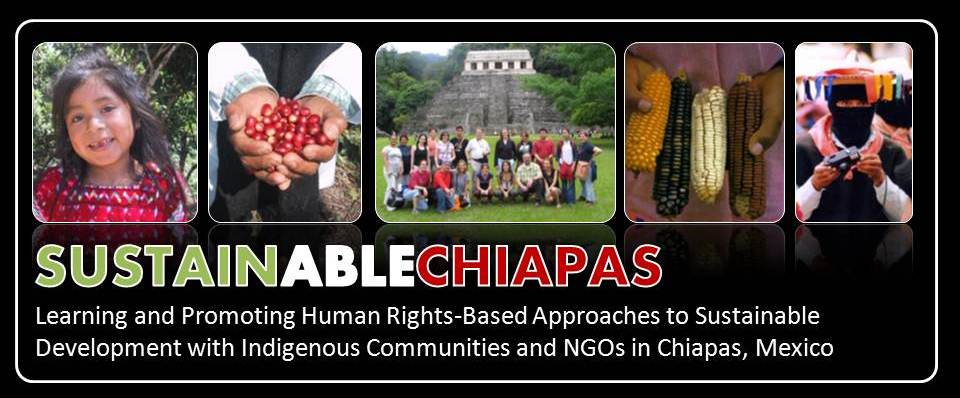 While visiting the Zapatista Caracol of Roberto Barrios in March 2004, DePaul University students learned something very important. As we were waiting for the security guards and the Junta de Buen Gobierno to receive us, we noticed how our letters of presentations were all well organized in a folder. While a few students were intimidated by their ski masks and initial diffidence, they were also very surprised of the friendly and honorific reception we receive at the end of our meeting. As masked man and women representatives of the Junta were expressing the growing poverty levels in their communities and the reasons of their Zapatista resistance, they asked us “not to leave them alone.” From their simple and clear words, students realized of their own international social responsibility in sharing what they have heard and observed in Chiapas. They realized that their best way to “help” the poor of Chiapas was to commit to a socially responsible personal and professional life as global citizens back in Chicago. They discovered something similar to what five century before Fray Bartolomé de Las Casas, the notorious defender of the “indios” and the first Bishop of Chiapas, realized: that to defend the rights of indigenous people in the New World, his main work was back in his motherland Spain (Casas & Varela, 1999). Fray Bartolomé stayed in Chiapas only about six months; our students only about ten days, but we all realize how political and economic decisions in the United States affect the life of indigenous people in Chiapas.
While visiting the Zapatista Caracol of Roberto Barrios in March 2004, DePaul University students learned something very important. As we were waiting for the security guards and the Junta de Buen Gobierno to receive us, we noticed how our letters of presentations were all well organized in a folder. While a few students were intimidated by their ski masks and initial diffidence, they were also very surprised of the friendly and honorific reception we receive at the end of our meeting. As masked man and women representatives of the Junta were expressing the growing poverty levels in their communities and the reasons of their Zapatista resistance, they asked us “not to leave them alone.” From their simple and clear words, students realized of their own international social responsibility in sharing what they have heard and observed in Chiapas. They realized that their best way to “help” the poor of Chiapas was to commit to a socially responsible personal and professional life as global citizens back in Chicago. They discovered something similar to what five century before Fray Bartolomé de Las Casas, the notorious defender of the “indios” and the first Bishop of Chiapas, realized: that to defend the rights of indigenous people in the New World, his main work was back in his motherland Spain (Casas & Varela, 1999). Fray Bartolomé stayed in Chiapas only about six months; our students only about ten days, but we all realize how political and economic decisions in the United States affect the life of indigenous people in Chiapas.International service learning for adult and professional students must go beyond “doing something for the poor” and realize the social responsibility for investing knowledge for the common good. Realizing international social injustices, one of the learning goals of the SPS Chiapas Program, should orient participants to become conscious that reducing poverty can be achieved only through a comprehensive strategy for achieving financial sustainability, increasing organizational capacity and social development and promoting-monitoring good governance (Lustig and Deutsch, 1998). The Vincentian values of our higher education institutions invites us to focus on a fourth dimension in poverty reduction: the faith-based view that we a moral responsibility to end poverty, promote justice and respect human dignity. The example of Saint Vincent de Paul, who, in-spite his dedicated support to foreign missions, invested almost all his life in Paris and France, reminds us of the importance of “thinking globally and act locally.” And even more, the rapid and intense interconnections of our flattening word suggest that international and professional service learning programs should invite participants think and act glocally. Chicago is the hub for numerous NGOs working in solidarity with Chiapas. The successfulness of a program is measured also by alumni engagement in organizations and issues related to the socio-economic, political and identity struggle represented by Chiapas indigenous organizations in resistance. The SPS Chiapas Program alumni have created organizations such as ChiapanECHO and solidarity initiatives like the Another World is Possible Conference that express their learning on the importance of building relations of reciprocity and raising consciousness of global interdependency.
Often professionals join the School of Public Service with the primary objective of obtaining a Master degree and advancing their career. They often do not think that a program would actually make them change entirely their perspectives on the meaning of learning (Cross, 1981). The Chiapas experience makes them rethink the opportunities and responsibilities that come with their education, expertise and leadership as professionals. They rediscover the importance of applying theory and analyzing reality of socially complex context and organizations for the goal of making this world a better place (Usher, Bryant & Johnston, 1997). The personal and professional leadership examples like Marina Patricia Jimenez and several other indigenous, Mexican and international leaders, makes them realize that a life entirely dedicated to the cause of the poor is not only an alternative lifestyle, it can also become their professional career as well.
